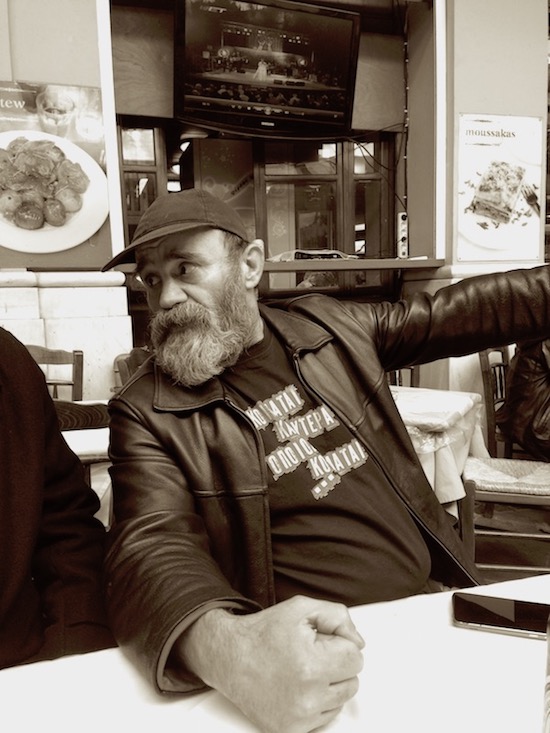
Konstantinos Polychronopoulos, Athens December 2016
Apologies, but I have to talk one more time before Christmas about why I’m in Greece, again. Some of what I am about to say will repeat earlier articles, but I promise, there’s plenty of new things. Because I’m coming to grips with the situation I’m in here, seeing the landscape, seeing things in their perspective.
I never had much use for -humanitarian- aid, I always had the same suspicion of what was going on in the field that just about everyone else has (where does the money go?). But then when I first went to Athens in June 2015, and asked Automatic Earth readers if they wanted to donate a little something for the poor in Greece, and that little something became $12,000 before I knew it, that all changed.
It meant I had to dig deeper and look closer, because this was me handing out other people’s money, and a lot of it. That’s how I met Konstantinos Polychronopoulos in July 2015, and I have since focused on him and his “O Allos Anthropos (The Other Human) ‘movement’, because in my view he represents the ideal fashion in which aid should be delivered. No overhead that gets subtracted from donations -other than equipment-, no salaries for anyone, just one on one aid.
There are about a dozen articles I’ve written over the past year and a half about him and his people at O Allos Anthropos, linked at the bottom of this article. And yes, I will also ask you once more to please donate to the Automatic Earth Fund for Athens (Paypal widget, top left hand column). Much as I don’t like asking anyone for anything when it comes to me, I simply can’t afford to be shy when it comes to this Greek Social Kitchen project.
Problem is, Konstantinos receives hardly any funding, except for the Automatic Earth. A bigger problem, as I’ve found out, is there’s a direct link between providing the most effective aid and not getting funded, strange as that may sound. And that’s what I want to talk about right here. That and what you and I could make possible for Konstantinos in 2017.
Look, I never cared for this kind of thing. I always felt that humanitarian aid is the responsibility of a government (still do, really). Not that I want a government to move into every nook and cranny of people’s lives, but when people in a society fall through the cracks and live in hunger or other forms of misery, their government should be there for them. It’s what we pay taxes for.
Moreover, I always thought that if you do get involved as a citizen, aid should be something you do close to where you live. And I don’t live in Athens. Where I do live is up for grabs, but it’s not Athens. Still, what I have become involved in here is a rare instance of what aid should be, and then it’s much less important where it takes place; besides, there’s a lot more need here than there is in either Holland or Canada, the closest I get to calling any place home.
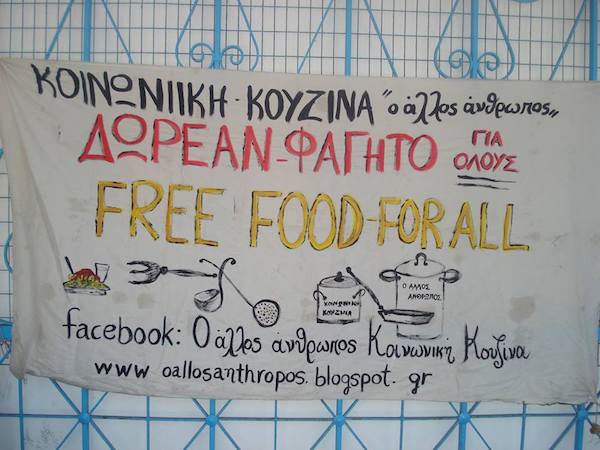
In thinking about why it’s so hard to get proper funding for Konstantinos, as I told you end November, in The Other Human Needs Your Help This Christmas, a large role is reserved for the fact that aid has become an industry like so many others. And that is really unfortunate, for many reasons.
But the past few days something else cropped up in my mind as well, which I feel defines the problem even better. That is the concept of “institutionalization” as forwarded by Austrian philosopher and priest -in New York and Mexico- Ivan Illich in the 1970’s. What Illich meant was that ‘institutions’ in society monopolize entire fields within that society.
Schools, colleges, universities have a monopoly on education (doctors and hospitals have a similar monopoly on health care). Only the degrees that educational institutions hand out recognize you as being smart -or fit for a job-, and the only people who hand out these degrees are those who have spent years wrecking their brains to get such degrees themselves. You’re not smart because you have a brain, you’re smart because you follow a program preset by people who have followed -very- similar programs. That’s “Institutionalization”.
A few quotes from Illich’s book 1971 book “Deschooling Society” (please stick with me, you’ll see where I’m going):
“Institutional wisdom tells us that children need school. Institutional wisdom tells us that children learn in school. But this institutional wisdom is itself the product of schools because sound common sense tells us that only children can be taught in school. Only by segregating human beings in the category of childhood could we ever get them to submit to the authority of a schoolteacher.”
You couldn’t lock up adults in classrooms the way we do kids. But what can kids do, they’re largely defenseless.
“Schools are designed on the assumption that there is a secret to everything in life; that the quality of life depends on knowing that secret; that secrets can be known only in orderly successions; and that only teachers can properly reveal these secrets. An individual with a schooled mind conceives of the world as a pyramid of classified packages accessible only to those who carry the proper tags.”
Your teachers went through the same brain-deafening torture that you now do, and they’re not about to admit that this was time wasted. Even if they realize it.
“A second major illusion on which the school system rests is that most learning is the result of teaching. Teaching, it is true, may contribute to certain kinds of learning under certain circumstances. But most people acquire most of their knowledge outside school, and in school only insofar as school, in a few rich countries, has become their place of confinement during an increasing part of their lives.”
Why do children learn in school? Only because they’re locked up in them umpteen hours a day. They could -and would- learn wherever they go (children learn, period, they couldn’t help it if they tried), but they’re not allowed to go ‘anywhere’.
“School appropriates the money, men, and good will available for education and in addition discourages other institutions from assuming educational tasks. Work, leisure, politics, city living, and even family life depend on schools for the habits and knowledge they presuppose, instead of becoming themselves the means of education.”
You’re not supposed to learn at home or in the world around you, learning is the monopoly of the schooling institutions. Of course you learn most of what’s valuable and useful outside of school, but we don’t talk about that.
Illich was equally clear about medicine:
“Modern medicine is a negation of health. It isn’t organized to serve human health, but only itself, as an institution. It makes more people sick than it heals. We must rediscover the distinction between hope and expectation. Effective health care depends on self-care; this fact is currently heralded as if it were a discovery.”
This monopoly our societies have provided to schools, teachers, doctors and hospitals has gotten ‘certified’ by the fact that they are the only ones in their fields who are funded by society, leaving any and all others too poor to even challenge them for their monopoly positions. It’s a closed circle.
In short, institutionalization is good for institutions, but never for those people they are supposed to be serving.

So how does this connect to Greece, to Konstantinos, and to all the people he’s trying to -devoted his whole life to- feed, and help in other ways? Here’s how: aid has been institutionalized too. There’s a set of rules, and if you don’t comply, you don’t qualify for funding. The funds then go to less efficient sources who do comply.
Konstantinos and I sat down for another talk last week, always interrupted by his incessantly ringing phone, and always accompanied by our dear friend and translator Tassos, because I wanted to know what these guys see as their future, what they want 2017 to bring that 2016 hasn’t yet.
One of the things that was said, and that’s what reminded me of Illich and institutionalization, is that if Konstantinos would want O Allos Anthropos to be registered as an NGO, and apply for funding through ‘official channels’, not only would he face ream upon ream of paperwork, he would also be forced to demand that every single person he and his people all across Greece serve a meal to, show them an ID. Or else be refused, hungry or not.
And not only would that go against everything Konstantinos stands for, and every reason he wants to serve “Free Food For All” (the main English-language slogan they have), it would mean he’d be from then on in part of the ‘framework’, the ‘institution’. And that framework, as we have seen in earlier articles, is not functioning anywhere near the way it should.
If you see pictures of long waiting lines for food, that’s because of that ID obligation. Sign here please, so the NGO can cash in another $5 or $7 per meal (O Allos Anthropos does it for less than $1 per person, and their meals are better).
Aid for the poorest and most miserable has been institutionalized. The priority has become whether those providing the services follow the rules of the ruling institution (in this case the EU), not whether those services are the best and/or most efficient they can be. Not only is it a giant waste of taxpayer money, Brussels has turned this, as it has done with many things concerning Greece, into a power game.
Tsipras want to help pensioners and underfed schoolchildren for Christmas? How dare he. Meanwhile, new stats this week said 9 out 10 unemployed Greeks get no support from the state, and 350,000 families have no wage earner. 300,000 educated Greeks have emigrated to find work. Scorched earth.
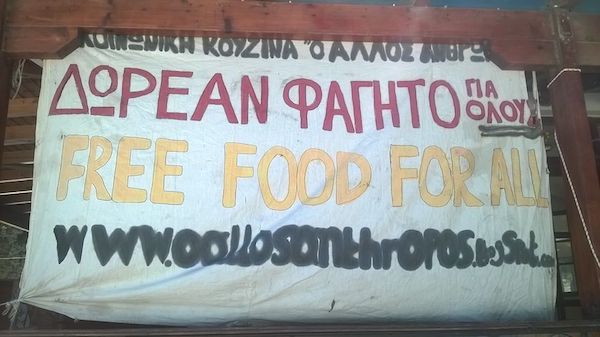
The EU has transferred hundreds of millions of euros to dozens of NGOs, but conditions in refugee camps around Greece, and personal conditions of people who are either inside these camps or elsewhere, are often still deplorable. Part of the blame rests with the Greek government, undoubtedly, but they can’t even take care of their own people, and the EU gives them very little to deal with the refugees.
The official line is that the government in Athens is not efficient enough when dealing with the issue. But the reality is the government feels it’s easier to comply with Brussels, and the city of Athens feels it’s easier to comply with the government. And they’re all fine, thank you, the PM and the mayor live in nice abodes. But they leave the homeless and refugees in no man’s limbo.
This is the huge void in which Konstantinos operates. Trying to help those people that others can’t or too often won’t. To at the very least feed them, and do what he can in other ways. Which without funding is an impossibly frustrating thing to do.
Not that he will ever show it, anymore than I want to make this sound like some kind of lament. Let’s instead turn to the future. Because there are of course plenty of plans. How we’re going to pay for them is a whole other story…

But first, a few maps I made. The first one shows the -5- places where there were ‘kitchens’ (in pink) when I hooked up with Konstantinos in July 2015, with no. 1 the ‘Big House’ on Plateon Street, as well as the -‘subsidiary’- locations (in red) where food was served with assistance from the Big House. I left the island of Lesbos off the map, because it’s so out of the way. It’s one the second map though.
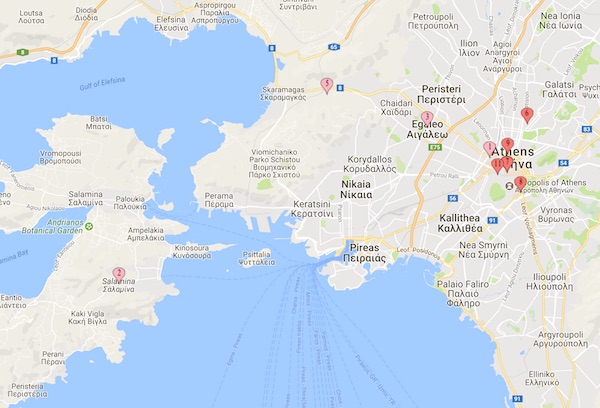
click map for full navigable version
The second map shows the 39(!) locations where food is served now (green are kitchens, yellow are ‘subsidiaries’), plus 9 other ones they would like to add in 2017 (in blue) . Click on the maps for a full, navigable version. I couldn’t embed them, sorry.
I should add that these are not all places where food is served 7 days a week, there is no money to do that. Often, unfortunately, it’s just once a week.
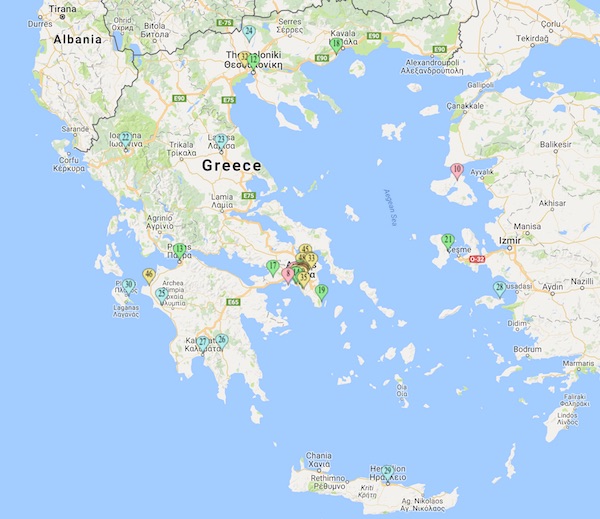
click map for full navigable version
This, I hope, gives you an idea of where your money has gone: the difference between the first map and the second is to a large extent due to your donations. Your money helps to feed people, in a very direct manner.
But that’s not nearly all yet. In the past few months, Konstantinos has traveled to Perugia, Italy, and to Barcelona, Spain. According to him, Social Kitchens are being set up as we speak in Barcelona and Alicante.
For 2017, he has invitations to visit – and help set up kitchens in- Manchester and London in the UK, The Hague in Holland, the Lebanon, Gaza -to let Israelis and Palestinians cook together, and a camp with 1 million refugees in Jordan. All with the Free Food For All principle in mind, not the Present Your ID or You’ll Go Hungry idea that the EU and NGOs adhere to.
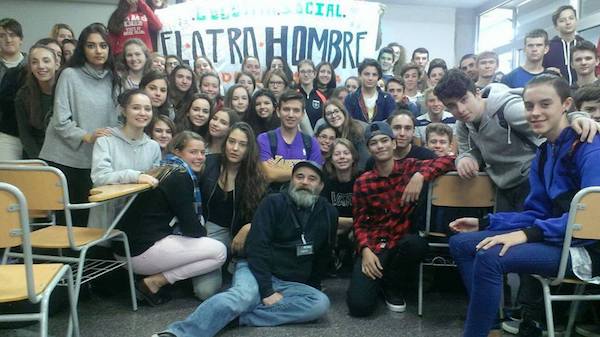
Konstantinos in Barcelona: El Otro Hombre
2017: In Greece, as I said, 9 more kitchens are waiting to be opened. Moreover, there are advanced plans, for which again there is no money, to start a -mobile- medical (and food) service for elderly Greeks in remote areas, where there are no facilities that are ‘reasonably accessible’ to them. All the necessary volunteers, doctors, nurses, you name it, everyone is on board.
But it will still take €8,000 to arrange for a vehicle that is properly equipped. Yeah, that’s all, surprised me too; I don’t know how he does it, but Konstantinos is confident he can do it for that. Donated equipment, volunteer crew, just paying cost for the moderate conversion of the vehicle. He’s a master at shoestring.
Once that is done, of course Konstantinos is dreaming of adding more such vehicles. Greece is a large enough country, and ever fewer people have access to health care. Then after that, one Big House will not be enough if instead of the 5,000 meals now served daily, the amount would, say, double (which it really should). So he also dreams of more Big Houses, central kitchens.
One sad detail that was mentioned is that the present -only- Big House is also a facility where many people, mainly homeless, go to take a shower, and do laundry, make sure their kids get properly educated, etc etc. But per address in Greece, water is one price up to a limit; if you use more, you pay a lot more for that. So offering laundry and shower facilities for those who have none, ends up costing an arm and a leg. One of many problems.
I must admit I have no idea where we’re going to go from here. But I’m not going to stop trying to keep this movement moving. I may fail, but it won’t be for a lack of effort. Because Konstantinos and his people deserve that I do that, and all the people they help, deserve it even more. I’ll be sure to keep you posted in the new year.
Both Konstantinos and myself -and all the other volunteers at O Allos Anthropos- want to thank you so much for all the help you’ve given over the past year -and in 2015-. We’re around $30,000 for 2016 alone, another $5000 since my last article 4 weeks ago. I swear, for as long as I live, this will never cease to amaze me.
And then of course what happens is people start thinking and dreaming about what more they can do for those in peril. Wouldn’t you know…
A Merry Christmas to all of you, to all of us. Very Merry. God bless us, every one. Thank you for everything.
If I may make a last suggestion, please forward this ‘dream’ to anyone you know -and even those you don’t-, by mail, Twitter, Facebook, Instagram, word of mouth, any which way you can think of. Go to your local mayor or town council, suggest they can help and get -loudly- recognized for it.
There may be a dream involved for 2017, but that was our notion a year ago as well, and look what we’ve achieved a year later: it is very real indeed.
And anyone, everyone can become part of that reality for just a few bucks. If the institutions won’t do it, perhaps the people themselves should. That doesn’t even sound all that crazy or farfetched. There’s a lot of us.

For donations to Konstantinos and O Allos Anthropos, the Automatic Earth has a Paypal widget on our front page, top left hand corner. On our Sales and Donations page, there is an address to send money orders and checks if you don’t like Paypal. Our Bitcoin address is 1HYLLUR2JFs24X1zTS4XbNJidGo2XNHiTT. For other forms of payment, drop us a line at Contact • at • TheAutomaticEarth • com.
To tell donations for Kostantinos apart from those for the Automatic Earth (which badly needs them too!), any amounts that come in ending in either $0.99 or $0.37, will go to O Allos Anthropos. Every penny goes where it belongs, no overhead. Guaranteed. It’s matter of honor.
Please give generously.

A list of the articles I wrote so far about Konstantinos and Athens.
June 16 2015
June 19 2015
June 25 2015
July 8 2015
July 11 2015
AE for Athens Fund 2nd Donation: The Man Who Cooks In The Street
July 22 2015
Nov 24 2015
Dec 25 2015
Help the Automatic Earth Help the Poorest Greeks and Refugees
Feb 1 2016
Mar 2 2016
Aug 9 2016
Nov 28 2016

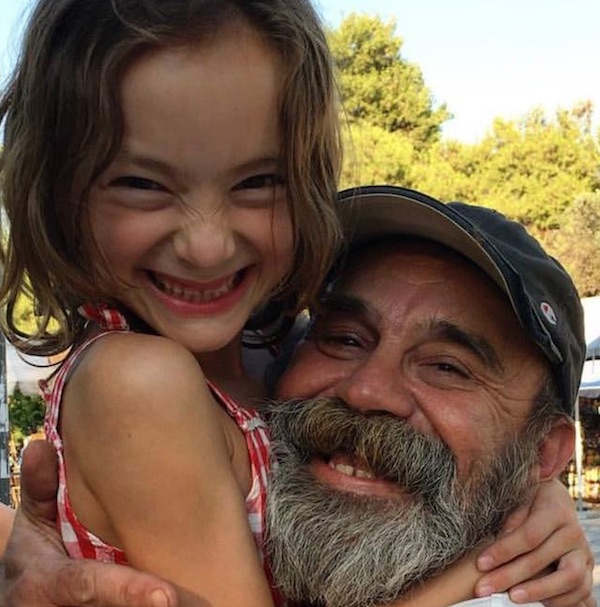
Konstantinos and a happy refugee








Home › Forums › The Automatic Earth in Greece: Big Dreams for 2017